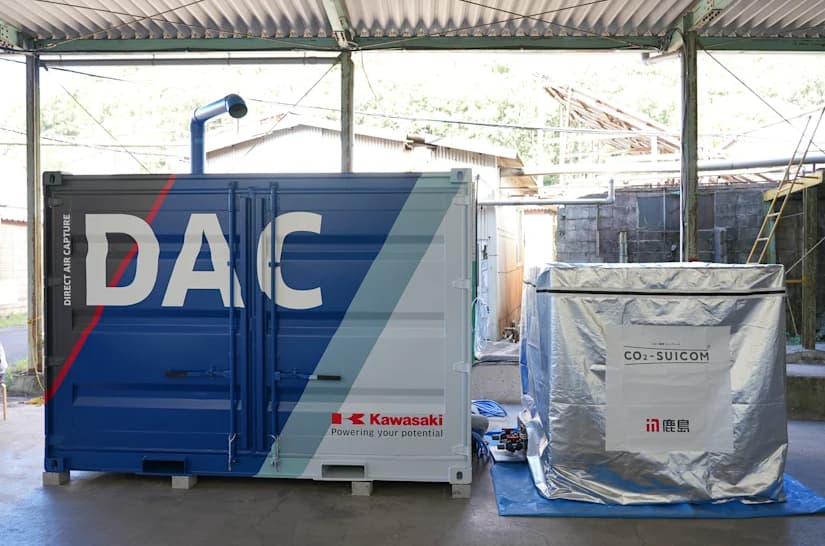
Epson to Launch Copier-sized Carbon Capture Device by 2028
Published by Todd Bush on June 12, 2025
Seiko Epson develops compact carbon capture unit for industrial emissions
Seiko Epson, the Japanese electronics company, is developing a small carbon capture unit roughly the size of an office printer. The device uses membrane separation technology to extract carbon dioxide from industrial emissions, which can then be recycled into synthetic fuels. Commercial release is expected in 2028.
Uses 10-nanometer for compact, efficient CO₂ capture
According to Japan’s Nikkei, Epson leveraged its expertise in inkjet printer component manufacturing to design a system capable of separating and capturing CO₂. The key lies in a specialized 10-nanometer membrane.
Conventional carbon capture methods typically rely on chemical absorption, where CO₂ is extracted by heating solvents that have absorbed emissions. This process requires a large surface area and significant energy, making even the smallest units taller than an average person.
In contrast, Epson’s membrane-based technology requires no heat, which reduces power consumption and significantly shrinks the device’s footprint. It runs on a standard 100-volt outlet and is compact enough for deployment in small-scale industrial sites like local factories.
When four units are linked, the system can capture more than 10 kilograms of concentrated CO₂ per day - roughly equivalent to the daily emissions of 1.4 Japanese households. While it can also be used to capture carbon from air, point-source capture remains more effective.
The device is expected to retail for several million yen. Epson is also considering treating the membrane as a consumable item that customers can replace, enabling ongoing system performance. Captured CO₂ can be repurposed for applications such as carbonated beverages, dry ice, or converted into synthetic fuels like methane.
Kawasaki Heavy Industries showcases carbon-absorbing concrete
According to Japan’s Ministry of Economy, Trade and Industry, citing IEA data, the market for CO₂ capture could grow to $12.6 billion by 2030 and surge to $245 billion by 2050.
As carbon capture gains momentum, other Japanese firms are also investing. Kawasaki Heavy Industries has already developed a direct air capture (DAC) system about the size of a shipping container, capable of capturing 5 kilograms of CO₂ per day. In March, the company partnered with Kajima Corporation to successfully store captured carbon in concrete, which is now being used at the Osaka Expo site.
>> In Other News: Carbon Capture Method Mines Cement Ingredients From the Air

Kawasaki Heavy Industries has developed a DAC system about the size of a shipping container, capable of capturing 5 kilograms of CO₂ per day.(Photo: Kawasaki Heavy Industries)
Southeast Asia is also entering the fray. Malaysia, with its abundant oil and gas reservoirs, holds significant carbon storage potential. The Malaysian parliament recently passed dedicated legislation to accelerate industry growth, aiming to make the country a regional hub for carbon capture and storage.
Source: Nikkei Asia
Subscribe to the newsletter
Daily decarbonization data and news delivered to your inbox
Follow the money flow of climate, technology, and energy investments to uncover new opportunities and jobs.
Latest issues
-
What Do Submarines Have to Do With Hydrogen?
Inside This Issue 🚢 Hyundai Pitches Hydrogen Transport Tied To Canada Submarine Bid 🧱 The LEGO Group Expands Its Portfolio Of Carbon Removal Solutions 🏆 SAF Pioneer LanzaJet Honored With RFA Indus...
-
This $4.1M Deal Could Change Carbon Capture's Playbook
Inside This Issue 🗜️ CarbonQuest Lands $4.1M Alberta Deal on Gas Compressors 🛡️ CADO, 123Carbon, and Assure SAF Registry Join Forces to Tackle SAF Integrity Gaps ✈️ ISCC, OMV, and Airbus Partner t...
-
Can Koloma Crack Iowa's Billion-Year-Old Secret?
Inside This Issue ⛏️ Iowa's Hydrogen Rush: Can Koloma Strike Gold Before Rules Kick In? ✈️ Bentley Commits to Use 100% Sustainable Aviation Fuel for Car Airfreight 🌬️ Minister Parrott Provides Upd...
Company Announcements
-
CHIFENG, China, Feb. 27, 2026 /PRNewswire/ -- Envision Energy launched the first global shipment of green ammonia from Chifeng, Inner Mongolia to LOTTE Fine Chemical, a premier chemical company in ...
-
SAF Pioneer LanzaJet Honored With RFA Industry Award
Pioneering sustainable aviation fuel producer LanzaJet received the Renewable Fuels Association’s 2026 Industry Award at the National Ethanol Conference in Orlando this week. Last year the company ...
-
Houston Hosts World Hydrogen North America 2026 Industry Gathering
Hydrogen is one of the energy sources that has evolved the most when it comes to how developers plan and execute projects. The main reason for this is the advanced technology that has penetrated th...
-
Trump EPA Eyes Reallocating Waived Biofuel Obligations To Refiners: Report
The question of whether to reallocate those exempted blending obligations to larger refiners is a point of contention between the agriculture and fuel industries The Trump administration has settl...